新概念英语第三册 Lesson 15 Fifty pence worth of trouble 讲义
文档属性
| 名称 | 新概念英语第三册 Lesson 15 Fifty pence worth of trouble 讲义 | 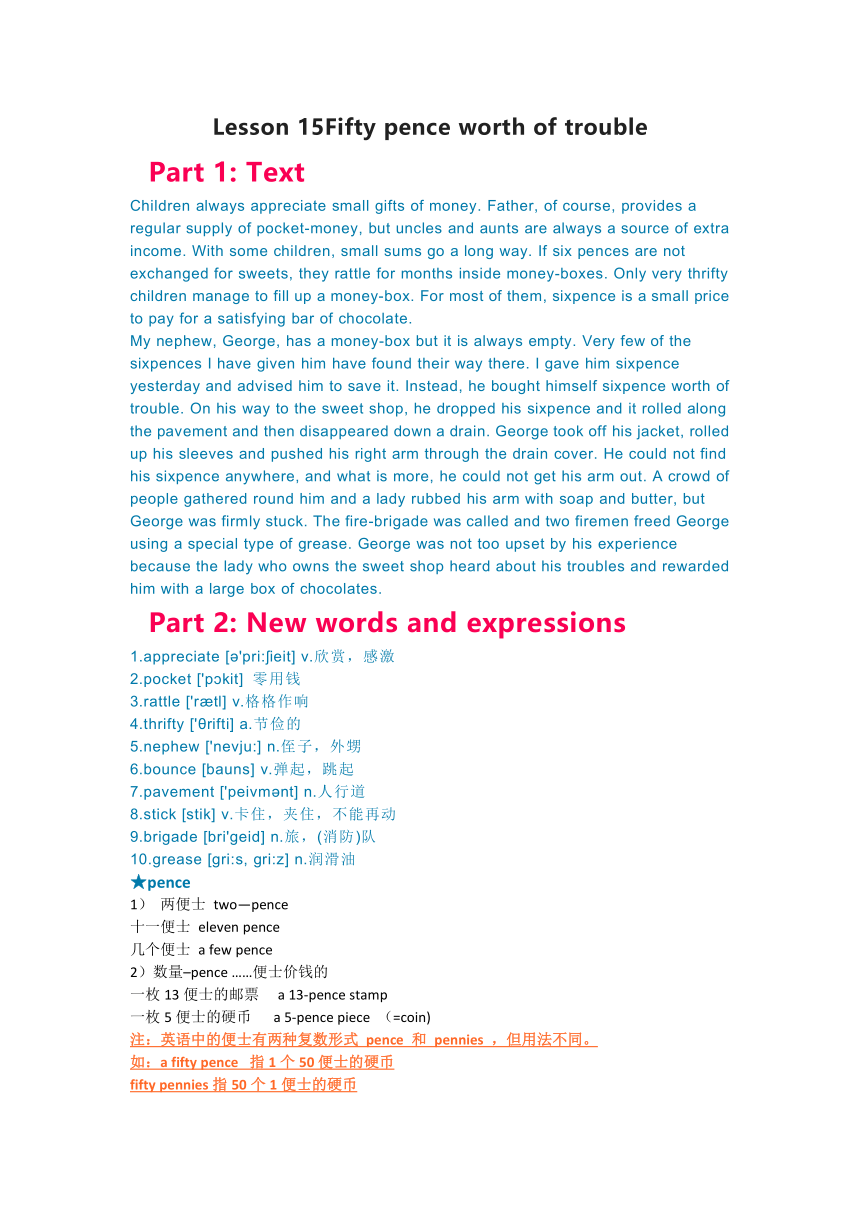 | |
| 格式 | docx | ||
| 文件大小 | 29.8KB | ||
| 资源类型 | 教案 | ||
| 版本资源 | 新概念英语 | ||
| 科目 | 英语 | ||
| 更新时间 | 2023-09-24 22:20:52 | ||
图片预览

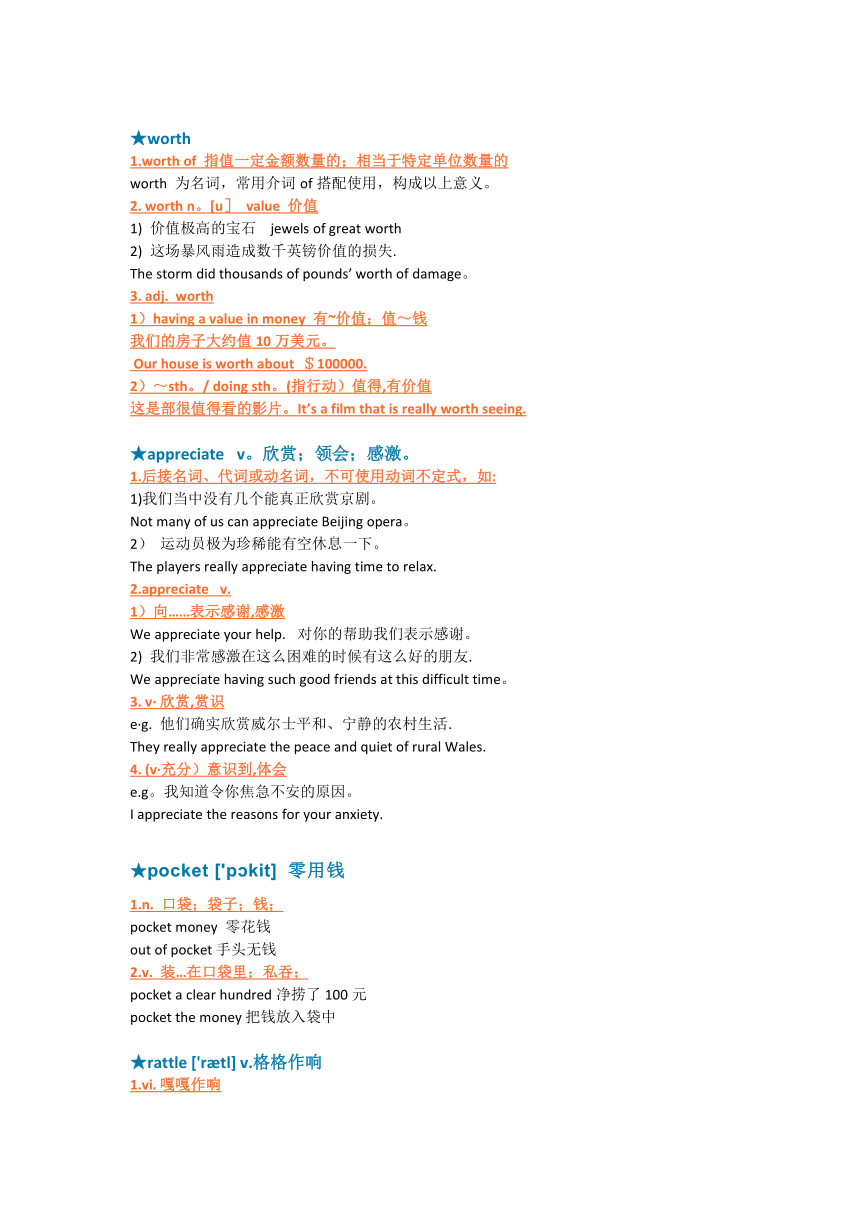
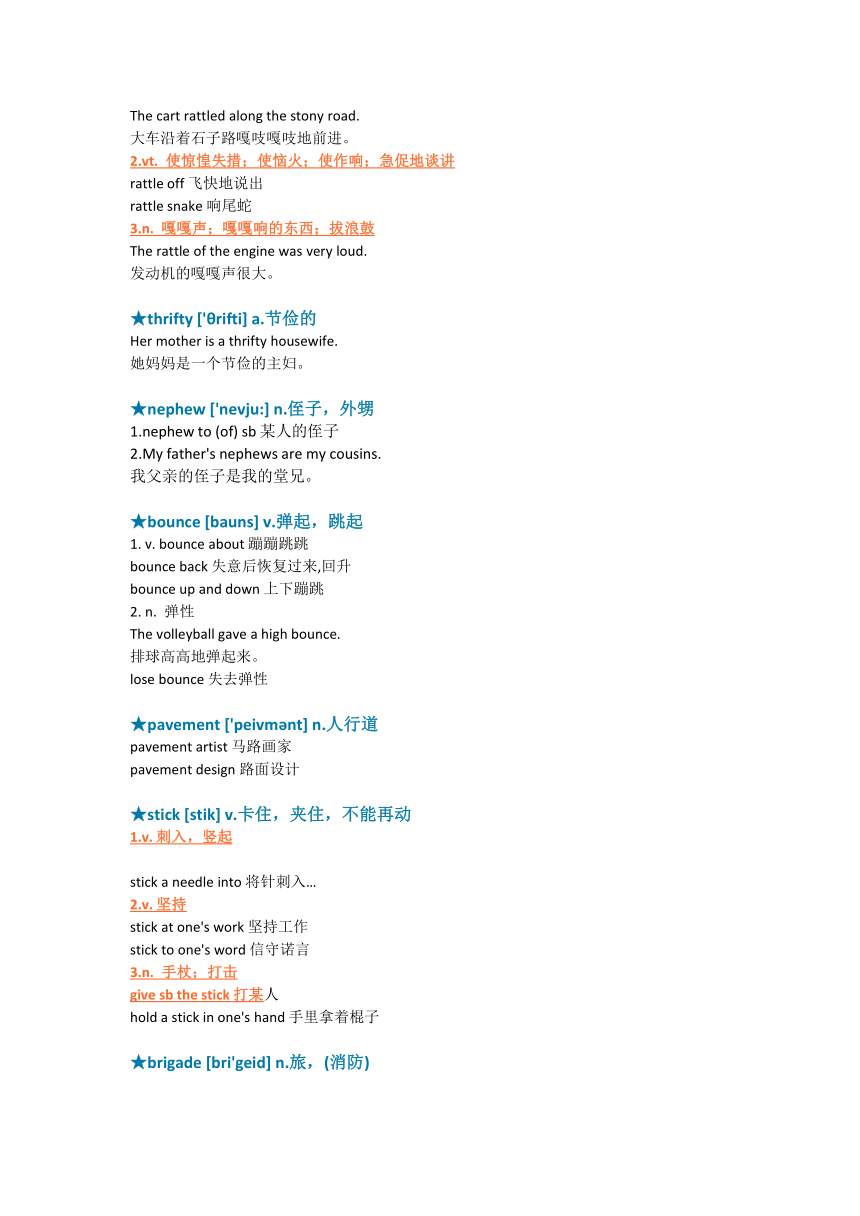
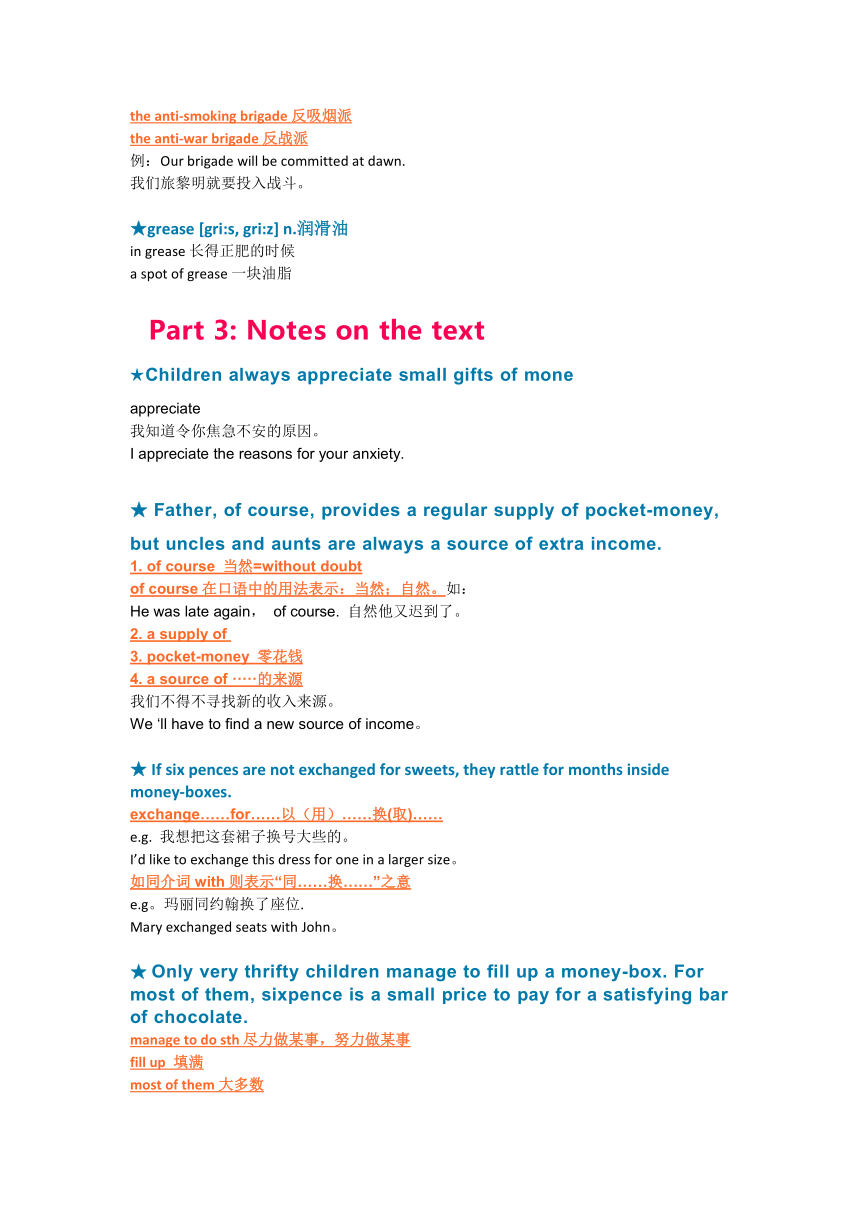
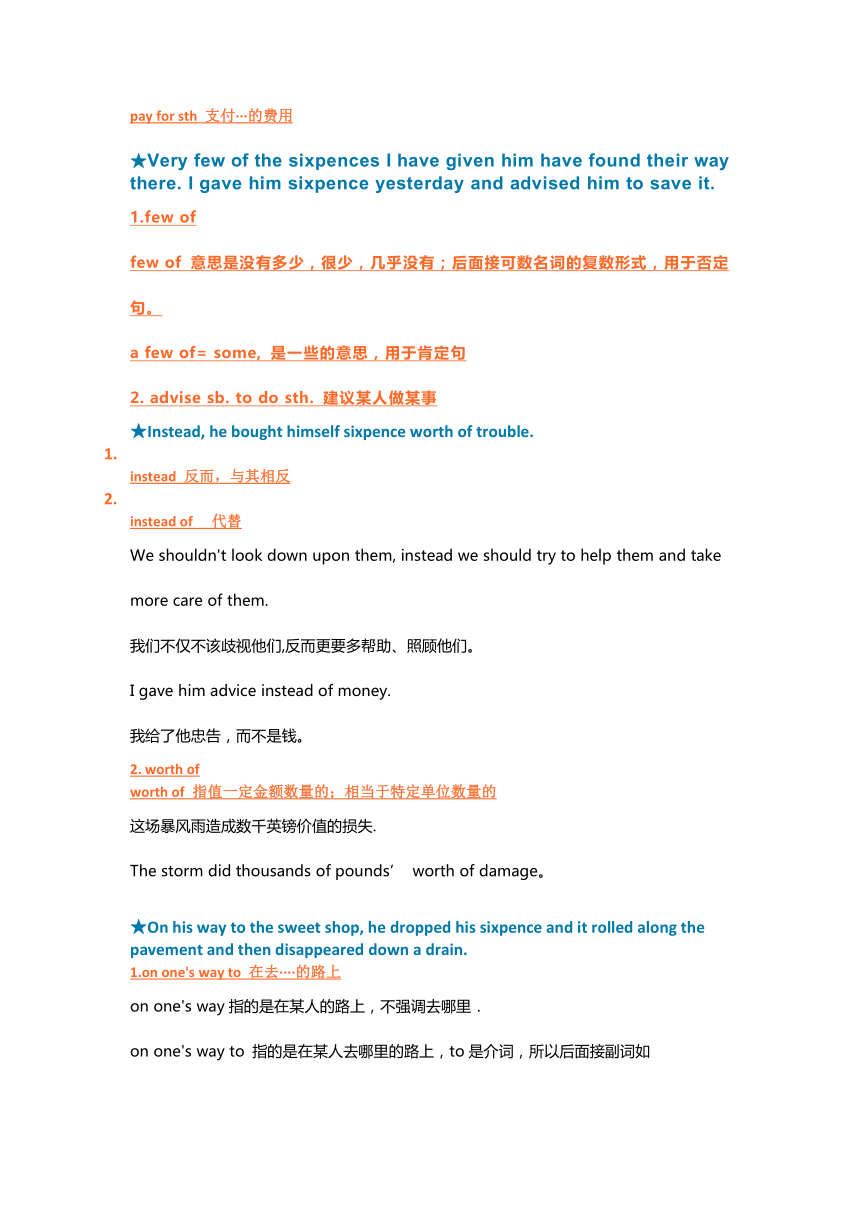
文档简介
Lesson 15Fifty pence worth of trouble
Part 1: Text
Children always appreciate small gifts of money. Father, of course, provides a regular supply of pocket-money, but uncles and aunts are always a source of extra income. With some children, small sums go a long way. If six pences are not exchanged for sweets, they rattle for months inside money-boxes. Only very thrifty children manage to fill up a money-box. For most of them, sixpence is a small price to pay for a satisfying bar of chocolate.
My nephew, George, has a money-box but it is always empty. Very few of the sixpences I have given him have found their way there. I gave him sixpence yesterday and advised him to save it. Instead, he bought himself sixpence worth of trouble. On his way to the sweet shop, he dropped his sixpence and it rolled along the pavement and then disappeared down a drain. George took off his jacket, rolled up his sleeves and pushed his right arm through the drain cover. He could not find his sixpence anywhere, and what is more, he could not get his arm out. A crowd of people gathered round him and a lady rubbed his arm with soap and butter, but George was firmly stuck. The fire-brigade was called and two firemen freed George using a special type of grease. George was not too upset by his experience because the lady who owns the sweet shop heard about his troubles and rewarded him with a large box of chocolates.
Part 2: New words and expressions
1.appreciate [ 'pri: ieit] v.欣赏,感激
2.pocket ['p kit] 零用钱
3.rattle ['r tl] v.格格作响
4.thrifty ['θrifti] a.节俭的
5.nephew ['nevju:] n.侄子,外甥
6.bounce [bauns] v.弹起,跳起
7.pavement ['peivm nt] n.人行道
8.stick [stik] v.卡住,夹住,不能再动
9.brigade [bri'geid] n.旅,(消防)队
10.grease [gri:s, gri:z] n.润滑油
★pence
1) 两便士 two—pence
十一便士 eleven pence
几个便士 a few pence
2)数量–pence ……便士价钱的
一枚13便士的邮票 a 13-pence stamp
一枚5便士的硬币 a 5-pence piece (=coin)
注:英语中的便士有两种复数形式 pence 和 pennies ,但用法不同。
如:a fifty pence 指1个50便士的硬币
fifty pennies指50个1便士的硬币
★worth
1.worth of 指值一定金额数量的;相当于特定单位数量的
worth 为名词,常用介词of搭配使用,构成以上意义。
2. worth n。[u] value 价值
1) 价值极高的宝石 jewels of great worth
2) 这场暴风雨造成数千英镑价值的损失.
The storm did thousands of pounds’ worth of damage。
3. adj. worth
1)having a value in money 有~价值;值~钱
我们的房子大约值10万美元。
Our house is worth about $100000.
2)~sth。/ doing sth。(指行动)值得,有价值
这是部很值得看的影片。It’s a film that is really worth seeing.
★appreciate v。欣赏;领会;感激。
1.后接名词、代词或动名词,不可使用动词不定式,如:
1)我们当中没有几个能真正欣赏京剧。
Not many of us can appreciate Beijing opera。
2) 运动员极为珍稀能有空休息一下。
The players really appreciate having time to relax.
2.appreciate v.
1)向……表示感谢,感激
We appreciate your help. 对你的帮助我们表示感谢。
2) 我们非常感激在这么困难的时候有这么好的朋友.
We appreciate having such good friends at this difficult time。
3. v· 欣赏,赏识
e·g. 他们确实欣赏威尔士平和、宁静的农村生活.
They really appreciate the peace and quiet of rural Wales.
4. (v·充分)意识到,体会
e.g。我知道令你焦急不安的原因。
I appreciate the reasons for your anxiety.
★pocket ['p kit] 零用钱
1.n. 口袋;袋子;钱;
pocket money 零花钱
out of pocket 手头无钱
2.v. 装…在口袋里;私吞;
pocket a clear hundred 净捞了100元
pocket the money 把钱放入袋中
★rattle ['r tl] v.格格作响
1.vi. 嘎嘎作响
The cart rattled along the stony road.
大车沿着石子路嘎吱嘎吱地前进。
2.vt. 使惊惶失措;使恼火;使作响;急促地谈讲
rattle off 飞快地说出
rattle snake 响尾蛇
3.n. 嘎嘎声;嘎嘎响的东西;拔浪鼓
The rattle of the engine was very loud.
发动机的嘎嘎声很大。
★thrifty ['θrifti] a.节俭的
Her mother is a thrifty housewife.
她妈妈是一个节俭的主妇。
★nephew ['nevju:] n.侄子,外甥
1.nephew to (of) sb 某人的侄子
2.My father's nephews are my cousins.
我父亲的侄子是我的堂兄。
★bounce [bauns] v.弹起,跳起
1. v. bounce about 蹦蹦跳跳
bounce back 失意后恢复过来,回升
bounce up and down 上下蹦跳
2. n. 弹性
The volleyball gave a high bounce.
排球高高地弹起来。
lose bounce 失去弹性
★pavement ['peivm nt] n.人行道
pavement artist 马路画家
pavement design 路面设计
★stick [stik] v.卡住,夹住,不能再动
1.v. 刺入,竖起
stick a needle into 将针刺入…
2.v. 坚持
stick at one's work 坚持工作
stick to one's word 信守诺言
3.n. 手杖;打击
give sb the stick 打某人
hold a stick in one's hand 手里拿着棍子
★brigade [bri'geid] n.旅,(消防)
the anti-smoking brigade 反吸烟派
the anti-war brigade 反战派
例:Our brigade will be committed at dawn.
我们旅黎明就要投入战斗。
★grease [gri:s, gri:z] n.润滑油
in grease 长得正肥的时候
a spot of grease 一块油脂
Part 3: Notes on the text
★Children always appreciate small gifts of mone
appreciate
我知道令你焦急不安的原因。
I appreciate the reasons for your anxiety.
★ Father, of course, provides a regular supply of pocket-money, but uncles and aunts are always a source of extra income.
1. of course 当然=without doubt
of course在口语中的用法表示:当然;自然。如:
He was late again, of course. 自然他又迟到了。
2. a supply of
3. pocket-money 零花钱
4. a source of ·····的来源
我们不得不寻找新的收入来源。
We ‘ll have to find a new source of income。
★ If six pences are not exchanged for sweets, they rattle for months inside money-boxes.
exchange……for……以(用)……换(取)……
e.g. 我想把这套裙子换号大些的。
I’d like to exchange this dress for one in a larger size。
如同介词with则表示“同……换……”之意
e.g。玛丽同约翰换了座位.
Mary exchanged seats with John。
★ Only very thrifty children manage to fill up a money-box. For most of them, sixpence is a small price to pay for a satisfying bar of chocolate.
manage to do sth 尽力做某事,努力做某事
fill up 填满
most of them 大多数
pay for sth 支付···的费用
★Very few of the sixpences I have given him have found their way there. I gave him sixpence yesterday and advised him to save it.
1.few of
few of 意思是没有多少,很少,几乎没有;后面接可数名词的复数形式,用于否定句。
a few of= some, 是一些的意思,用于肯定句
2. advise sb. to do sth. 建议某人做某事
★Instead, he bought himself sixpence worth of trouble.
instead 反而,与其相反
instead of 代替
We shouldn't look down upon them, instead we should try to help them and take more care of them.
我们不仅不该歧视他们,反而更要多帮助、照顾他们。
I gave him advice instead of money.
我给了他忠告,而不是钱。
2. worth of
worth of 指值一定金额数量的;相当于特定单位数量的
这场暴风雨造成数千英镑价值的损失.
The storm did thousands of pounds’ worth of damage。
★On his way to the sweet shop, he dropped his sixpence and it rolled along the pavement and then disappeared down a drain.
1.on one's way to 在去····的路上
on one's way指的是在某人的路上,不强调去哪里.
on one's way to 指的是在某人去哪里的路上,to是介词,所以后面接副词如home,there,here等时要省略to,就变成了on one's way home,其实还是on one's way to的变形.
2. drop,丢下,掉下,落下
The apple dropped from the tree to the ground. 苹果从树上掉到地上。
★He could not find his sixpence anywhere, and what is more, he could not get his arm out.
1.not anywhere(yong yu 否定)= everywhere (用于肯定)
2.what is more
这是一个固定短语,用作插入语,可以放在句前或者句中,后面加一逗号.意思是“加之,而且”之意.相当于besides ,in addition.例如:It's a useful book and ,what's more,a cheap one.这是本有用的书,而且还不贵.
3. get sth out 取出,拿出
★A crowd of people gathered round him and a lady rubbed his arm with soap and butter, but George was firmly stuck.
1.a crowd of····· 一群····
crowd这个词,指的通常是【人群】,a crowd of people, a crowd of students, 所以后面是可数名词。
2.gather round 围拢,聚集
3. rub with
I rubbed the window with a cloth.
我用一块布擦窗子。
★George was not too upset by his experience because the lady who owns the sweet shop heard about his troubles and rewarded him with a large box of chocolates.
1. hear about 听说
hear of + sb./sth 听到或知道某人[某事物]的情况
I have never heard of him since he left. 自从他离开后,我再没听到过他的消息。
hear from + sb=receive a letter from 接到某人的来信、 电话等
Do you hear from you daughter this week 今周你有收到你女儿的信吗?
2. reward sb with sth
The police are offering a big reward for information about the robbery.(警方出大笔赏金要求提供那起抢劫案的破案线索。
Part 4: Grammar&Difficult points
up用法归纳
up具有两种词性:副词和介词
后边没有宾语或跟有其他介词时,up为副词,后边跟有宾语时,up为介词.
1.表示“向目的地”或“向说话人所在地”
如:The bus couductor came up to me.(副词)公共汽车售票员向我走来.(说话人所在地)
The main troops moved up to the front.(副词)主力部队向前线开去.(目的地)
2.表示“向(在)上,向(在)北方,向(在)中心地带,向(在)住宅区”等,其反义词为down,如:He's now up on the roof.(副词)他现在在房顶上.
They are climbing up the hill.(介词)他们正在登山.
His home is up in the North.(副词)他的家在北方.
The Red Army was then going up to resist the Japanese invaders.(副词)红军当时正北上抗日.I
'm going up to Beijing next week.(副词)下个星期我将到北京去.
They sailed up the river.(介词)他们向河的上游驶去.
The returned overseas Chinese travelled up the country.(介词)那些归国华侨在内地旅行.
He's gone downtown shopping and he'll be(up)home in an hour.(副词)他进城去买东西去了,过一个小时就回来.
3.up跟road/street搭配时,有时不表示“向北,向上”,而表示:
1)“沿着”,相当于down或along,如:I was walking up/down/along the road.(介词)我沿着大街走.
2)up有“向近处来”之意,down则有“向远处去”之意,
如:Just then I saw some students coming up the street.(介词)正在那时,我看见一些学生朝这边走来.
I hurried down the steps and ran down the street trying to catch up with him.(该句中down是介词,up是动—副—介型多词动词里的小品副词)我匆匆走下台阶,向街的远处跑去,想追上他.
4.be up表示
1)起床;
2)结束
Is he up yet 他起床了吗
No,he isn't.没有.
Time's up.(-The time is up.)时间到了.
When is your leave up 你的休假到期了吗
5.up to将近(=nearly)
A walking fish can stay outside of the water for up to twelve hours.会走的鱼能在水外呆将近12小时.
6.be up to sb.to do sth.表示“由某人负责做某事”.
如:It was up to me to get the four of us moving.该由我负责使我们四人行动起来.
It is up to you to decide.这得由你决定.
7.跟动词连用表示多种意义,如:
1)跟某些动词连用,表示“向上,起来”之意,如:set up搭起
sit up坐起来
sail up驶向上游
stand up站起来
climb up爬上 go up上升 pick up捡起 pull up拔出 get up起床 pile up堆起 screw up鼓起 look up举目 crawl up爬上 move up向上移动 rush up向上冲
2)跟某些动词连用表示“(使)处于,保持在高处”之意,
如:hang(keep,stop,tie,fix,stay)up挂(保持,停,捆,固定,呆)在上面
3)跟某些及物动词连用,表示“把……完成或破坏掉”之意,
如:cover up盖上 drink up喝完 cut up砍掉 dry up弄干 eat up吃光 wash up洗掉 fill up装满 light up照亮 make up组成 pack up包上 tear up撕掉 tie up捆上 use up用完 catch up赶上 burn up烧掉 shut up将……关起来 lock up把……锁起来 clean up把……收拾干净 wrap up把……包起来
4)跟某些动词连用,各有其意,有的还一词多义.
如:sit/stay up开夜车 ring/call up打电话do up
up跟动词连用构成短语动词时,均是副词.
Part 5: Homework
1.背诵lesson 15单词&课文(重点语句解析需背诵)
2.书信写作
3.练习总结课文
Part 1: Text
Children always appreciate small gifts of money. Father, of course, provides a regular supply of pocket-money, but uncles and aunts are always a source of extra income. With some children, small sums go a long way. If six pences are not exchanged for sweets, they rattle for months inside money-boxes. Only very thrifty children manage to fill up a money-box. For most of them, sixpence is a small price to pay for a satisfying bar of chocolate.
My nephew, George, has a money-box but it is always empty. Very few of the sixpences I have given him have found their way there. I gave him sixpence yesterday and advised him to save it. Instead, he bought himself sixpence worth of trouble. On his way to the sweet shop, he dropped his sixpence and it rolled along the pavement and then disappeared down a drain. George took off his jacket, rolled up his sleeves and pushed his right arm through the drain cover. He could not find his sixpence anywhere, and what is more, he could not get his arm out. A crowd of people gathered round him and a lady rubbed his arm with soap and butter, but George was firmly stuck. The fire-brigade was called and two firemen freed George using a special type of grease. George was not too upset by his experience because the lady who owns the sweet shop heard about his troubles and rewarded him with a large box of chocolates.
Part 2: New words and expressions
1.appreciate [ 'pri: ieit] v.欣赏,感激
2.pocket ['p kit] 零用钱
3.rattle ['r tl] v.格格作响
4.thrifty ['θrifti] a.节俭的
5.nephew ['nevju:] n.侄子,外甥
6.bounce [bauns] v.弹起,跳起
7.pavement ['peivm nt] n.人行道
8.stick [stik] v.卡住,夹住,不能再动
9.brigade [bri'geid] n.旅,(消防)队
10.grease [gri:s, gri:z] n.润滑油
★pence
1) 两便士 two—pence
十一便士 eleven pence
几个便士 a few pence
2)数量–pence ……便士价钱的
一枚13便士的邮票 a 13-pence stamp
一枚5便士的硬币 a 5-pence piece (=coin)
注:英语中的便士有两种复数形式 pence 和 pennies ,但用法不同。
如:a fifty pence 指1个50便士的硬币
fifty pennies指50个1便士的硬币
★worth
1.worth of 指值一定金额数量的;相当于特定单位数量的
worth 为名词,常用介词of搭配使用,构成以上意义。
2. worth n。[u] value 价值
1) 价值极高的宝石 jewels of great worth
2) 这场暴风雨造成数千英镑价值的损失.
The storm did thousands of pounds’ worth of damage。
3. adj. worth
1)having a value in money 有~价值;值~钱
我们的房子大约值10万美元。
Our house is worth about $100000.
2)~sth。/ doing sth。(指行动)值得,有价值
这是部很值得看的影片。It’s a film that is really worth seeing.
★appreciate v。欣赏;领会;感激。
1.后接名词、代词或动名词,不可使用动词不定式,如:
1)我们当中没有几个能真正欣赏京剧。
Not many of us can appreciate Beijing opera。
2) 运动员极为珍稀能有空休息一下。
The players really appreciate having time to relax.
2.appreciate v.
1)向……表示感谢,感激
We appreciate your help. 对你的帮助我们表示感谢。
2) 我们非常感激在这么困难的时候有这么好的朋友.
We appreciate having such good friends at this difficult time。
3. v· 欣赏,赏识
e·g. 他们确实欣赏威尔士平和、宁静的农村生活.
They really appreciate the peace and quiet of rural Wales.
4. (v·充分)意识到,体会
e.g。我知道令你焦急不安的原因。
I appreciate the reasons for your anxiety.
★pocket ['p kit] 零用钱
1.n. 口袋;袋子;钱;
pocket money 零花钱
out of pocket 手头无钱
2.v. 装…在口袋里;私吞;
pocket a clear hundred 净捞了100元
pocket the money 把钱放入袋中
★rattle ['r tl] v.格格作响
1.vi. 嘎嘎作响
The cart rattled along the stony road.
大车沿着石子路嘎吱嘎吱地前进。
2.vt. 使惊惶失措;使恼火;使作响;急促地谈讲
rattle off 飞快地说出
rattle snake 响尾蛇
3.n. 嘎嘎声;嘎嘎响的东西;拔浪鼓
The rattle of the engine was very loud.
发动机的嘎嘎声很大。
★thrifty ['θrifti] a.节俭的
Her mother is a thrifty housewife.
她妈妈是一个节俭的主妇。
★nephew ['nevju:] n.侄子,外甥
1.nephew to (of) sb 某人的侄子
2.My father's nephews are my cousins.
我父亲的侄子是我的堂兄。
★bounce [bauns] v.弹起,跳起
1. v. bounce about 蹦蹦跳跳
bounce back 失意后恢复过来,回升
bounce up and down 上下蹦跳
2. n. 弹性
The volleyball gave a high bounce.
排球高高地弹起来。
lose bounce 失去弹性
★pavement ['peivm nt] n.人行道
pavement artist 马路画家
pavement design 路面设计
★stick [stik] v.卡住,夹住,不能再动
1.v. 刺入,竖起
stick a needle into 将针刺入…
2.v. 坚持
stick at one's work 坚持工作
stick to one's word 信守诺言
3.n. 手杖;打击
give sb the stick 打某人
hold a stick in one's hand 手里拿着棍子
★brigade [bri'geid] n.旅,(消防)
the anti-smoking brigade 反吸烟派
the anti-war brigade 反战派
例:Our brigade will be committed at dawn.
我们旅黎明就要投入战斗。
★grease [gri:s, gri:z] n.润滑油
in grease 长得正肥的时候
a spot of grease 一块油脂
Part 3: Notes on the text
★Children always appreciate small gifts of mone
appreciate
我知道令你焦急不安的原因。
I appreciate the reasons for your anxiety.
★ Father, of course, provides a regular supply of pocket-money, but uncles and aunts are always a source of extra income.
1. of course 当然=without doubt
of course在口语中的用法表示:当然;自然。如:
He was late again, of course. 自然他又迟到了。
2. a supply of
3. pocket-money 零花钱
4. a source of ·····的来源
我们不得不寻找新的收入来源。
We ‘ll have to find a new source of income。
★ If six pences are not exchanged for sweets, they rattle for months inside money-boxes.
exchange……for……以(用)……换(取)……
e.g. 我想把这套裙子换号大些的。
I’d like to exchange this dress for one in a larger size。
如同介词with则表示“同……换……”之意
e.g。玛丽同约翰换了座位.
Mary exchanged seats with John。
★ Only very thrifty children manage to fill up a money-box. For most of them, sixpence is a small price to pay for a satisfying bar of chocolate.
manage to do sth 尽力做某事,努力做某事
fill up 填满
most of them 大多数
pay for sth 支付···的费用
★Very few of the sixpences I have given him have found their way there. I gave him sixpence yesterday and advised him to save it.
1.few of
few of 意思是没有多少,很少,几乎没有;后面接可数名词的复数形式,用于否定句。
a few of= some, 是一些的意思,用于肯定句
2. advise sb. to do sth. 建议某人做某事
★Instead, he bought himself sixpence worth of trouble.
instead 反而,与其相反
instead of 代替
We shouldn't look down upon them, instead we should try to help them and take more care of them.
我们不仅不该歧视他们,反而更要多帮助、照顾他们。
I gave him advice instead of money.
我给了他忠告,而不是钱。
2. worth of
worth of 指值一定金额数量的;相当于特定单位数量的
这场暴风雨造成数千英镑价值的损失.
The storm did thousands of pounds’ worth of damage。
★On his way to the sweet shop, he dropped his sixpence and it rolled along the pavement and then disappeared down a drain.
1.on one's way to 在去····的路上
on one's way指的是在某人的路上,不强调去哪里.
on one's way to 指的是在某人去哪里的路上,to是介词,所以后面接副词如home,there,here等时要省略to,就变成了on one's way home,其实还是on one's way to的变形.
2. drop,丢下,掉下,落下
The apple dropped from the tree to the ground. 苹果从树上掉到地上。
★He could not find his sixpence anywhere, and what is more, he could not get his arm out.
1.not anywhere(yong yu 否定)= everywhere (用于肯定)
2.what is more
这是一个固定短语,用作插入语,可以放在句前或者句中,后面加一逗号.意思是“加之,而且”之意.相当于besides ,in addition.例如:It's a useful book and ,what's more,a cheap one.这是本有用的书,而且还不贵.
3. get sth out 取出,拿出
★A crowd of people gathered round him and a lady rubbed his arm with soap and butter, but George was firmly stuck.
1.a crowd of····· 一群····
crowd这个词,指的通常是【人群】,a crowd of people, a crowd of students, 所以后面是可数名词。
2.gather round 围拢,聚集
3. rub with
I rubbed the window with a cloth.
我用一块布擦窗子。
★George was not too upset by his experience because the lady who owns the sweet shop heard about his troubles and rewarded him with a large box of chocolates.
1. hear about 听说
hear of + sb./sth 听到或知道某人[某事物]的情况
I have never heard of him since he left. 自从他离开后,我再没听到过他的消息。
hear from + sb=receive a letter from 接到某人的来信、 电话等
Do you hear from you daughter this week 今周你有收到你女儿的信吗?
2. reward sb with sth
The police are offering a big reward for information about the robbery.(警方出大笔赏金要求提供那起抢劫案的破案线索。
Part 4: Grammar&Difficult points
up用法归纳
up具有两种词性:副词和介词
后边没有宾语或跟有其他介词时,up为副词,后边跟有宾语时,up为介词.
1.表示“向目的地”或“向说话人所在地”
如:The bus couductor came up to me.(副词)公共汽车售票员向我走来.(说话人所在地)
The main troops moved up to the front.(副词)主力部队向前线开去.(目的地)
2.表示“向(在)上,向(在)北方,向(在)中心地带,向(在)住宅区”等,其反义词为down,如:He's now up on the roof.(副词)他现在在房顶上.
They are climbing up the hill.(介词)他们正在登山.
His home is up in the North.(副词)他的家在北方.
The Red Army was then going up to resist the Japanese invaders.(副词)红军当时正北上抗日.I
'm going up to Beijing next week.(副词)下个星期我将到北京去.
They sailed up the river.(介词)他们向河的上游驶去.
The returned overseas Chinese travelled up the country.(介词)那些归国华侨在内地旅行.
He's gone downtown shopping and he'll be(up)home in an hour.(副词)他进城去买东西去了,过一个小时就回来.
3.up跟road/street搭配时,有时不表示“向北,向上”,而表示:
1)“沿着”,相当于down或along,如:I was walking up/down/along the road.(介词)我沿着大街走.
2)up有“向近处来”之意,down则有“向远处去”之意,
如:Just then I saw some students coming up the street.(介词)正在那时,我看见一些学生朝这边走来.
I hurried down the steps and ran down the street trying to catch up with him.(该句中down是介词,up是动—副—介型多词动词里的小品副词)我匆匆走下台阶,向街的远处跑去,想追上他.
4.be up表示
1)起床;
2)结束
Is he up yet 他起床了吗
No,he isn't.没有.
Time's up.(-The time is up.)时间到了.
When is your leave up 你的休假到期了吗
5.up to将近(=nearly)
A walking fish can stay outside of the water for up to twelve hours.会走的鱼能在水外呆将近12小时.
6.be up to sb.to do sth.表示“由某人负责做某事”.
如:It was up to me to get the four of us moving.该由我负责使我们四人行动起来.
It is up to you to decide.这得由你决定.
7.跟动词连用表示多种意义,如:
1)跟某些动词连用,表示“向上,起来”之意,如:set up搭起
sit up坐起来
sail up驶向上游
stand up站起来
climb up爬上 go up上升 pick up捡起 pull up拔出 get up起床 pile up堆起 screw up鼓起 look up举目 crawl up爬上 move up向上移动 rush up向上冲
2)跟某些动词连用表示“(使)处于,保持在高处”之意,
如:hang(keep,stop,tie,fix,stay)up挂(保持,停,捆,固定,呆)在上面
3)跟某些及物动词连用,表示“把……完成或破坏掉”之意,
如:cover up盖上 drink up喝完 cut up砍掉 dry up弄干 eat up吃光 wash up洗掉 fill up装满 light up照亮 make up组成 pack up包上 tear up撕掉 tie up捆上 use up用完 catch up赶上 burn up烧掉 shut up将……关起来 lock up把……锁起来 clean up把……收拾干净 wrap up把……包起来
4)跟某些动词连用,各有其意,有的还一词多义.
如:sit/stay up开夜车 ring/call up打电话do up
up跟动词连用构成短语动词时,均是副词.
Part 5: Homework
1.背诵lesson 15单词&课文(重点语句解析需背诵)
2.书信写作
3.练习总结课文
同课章节目录
